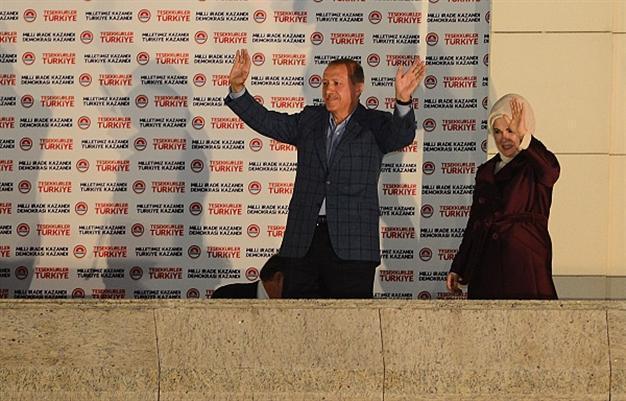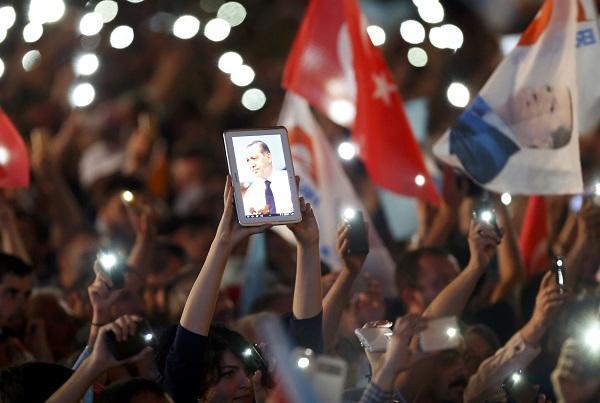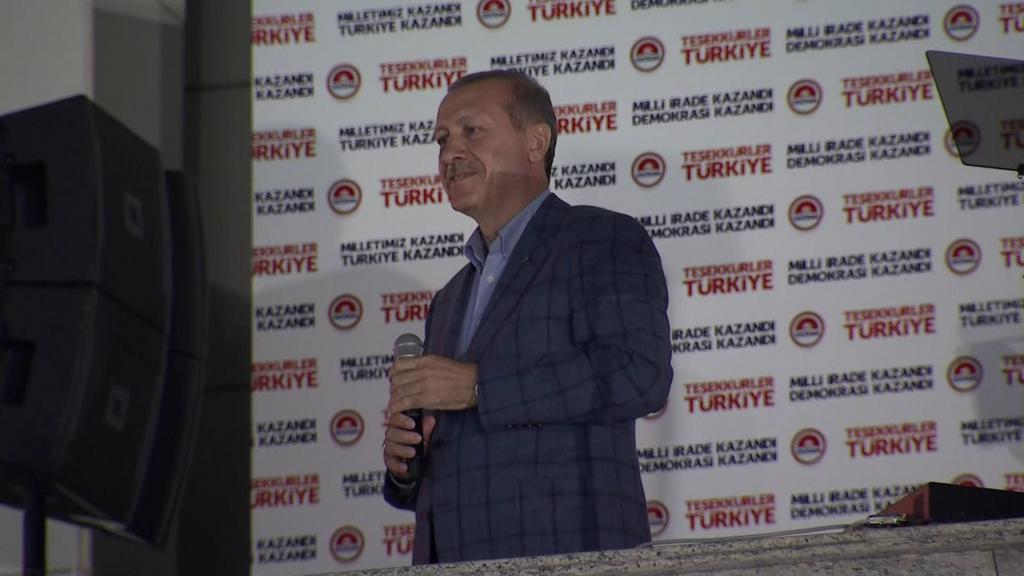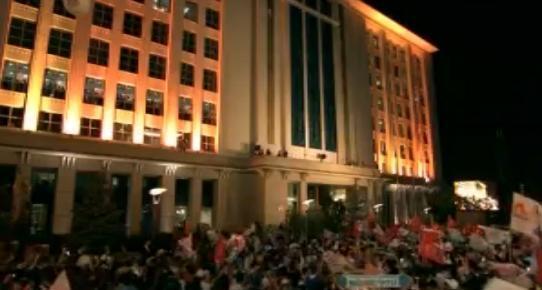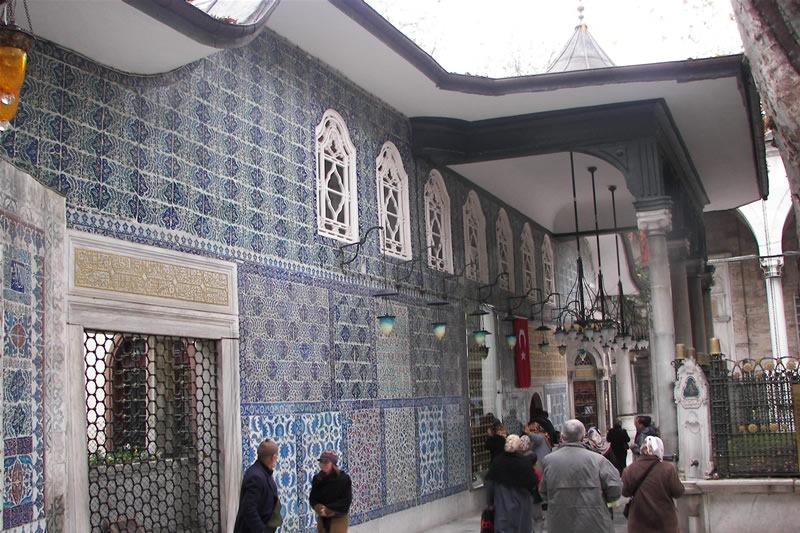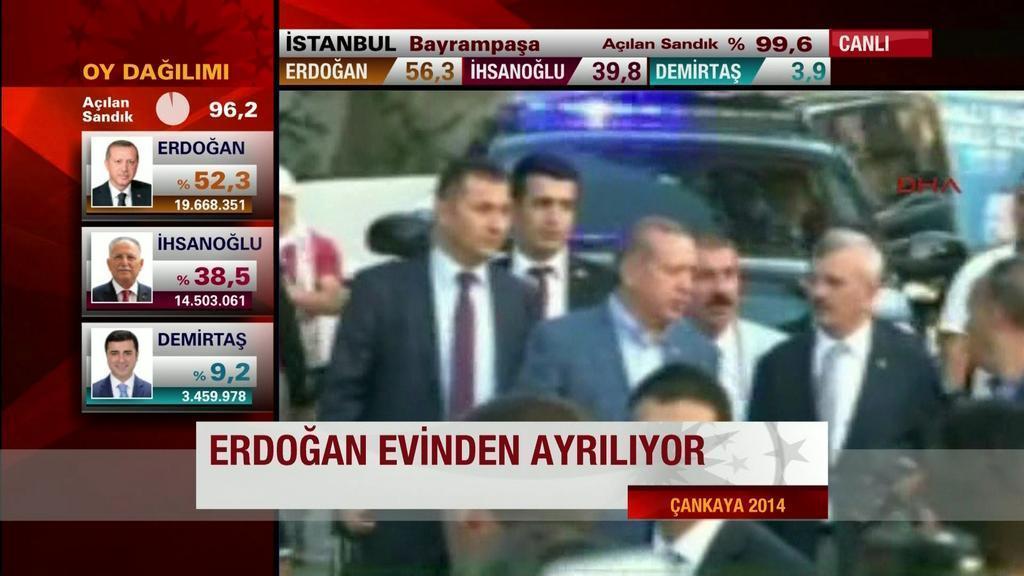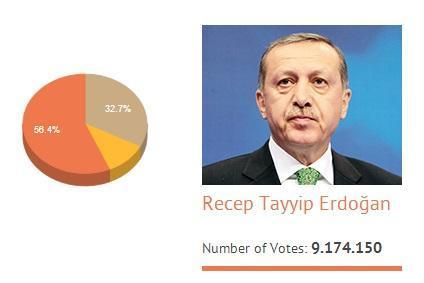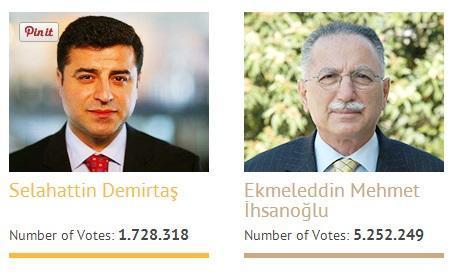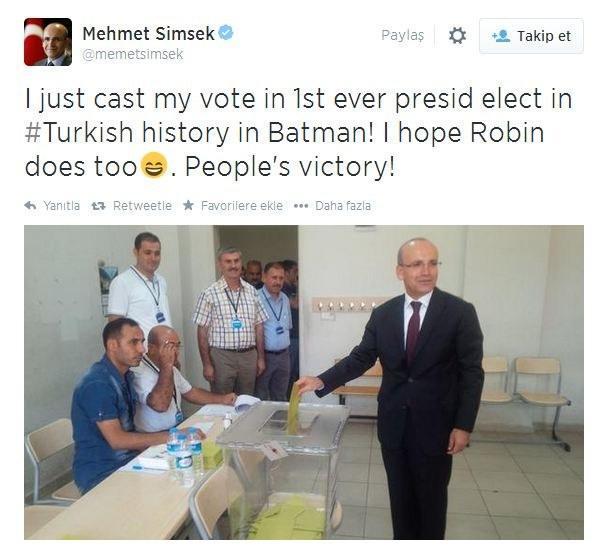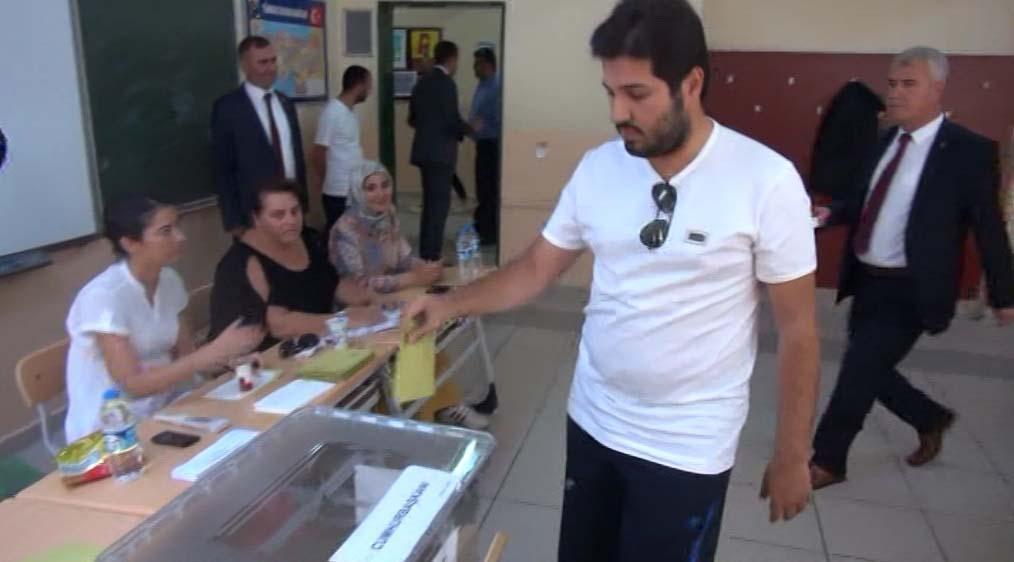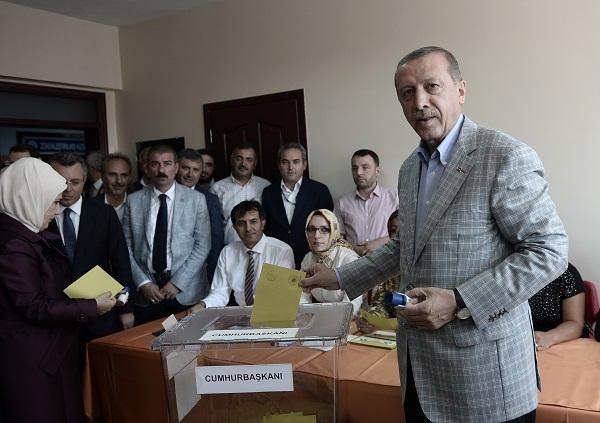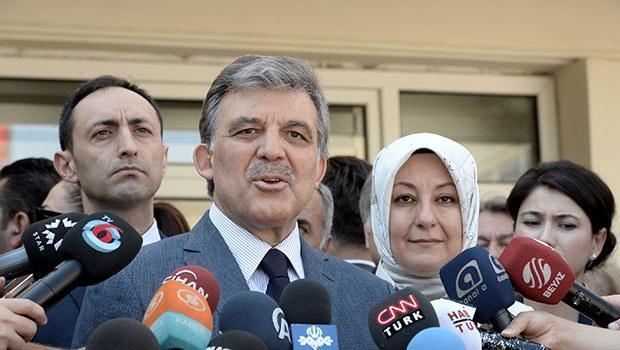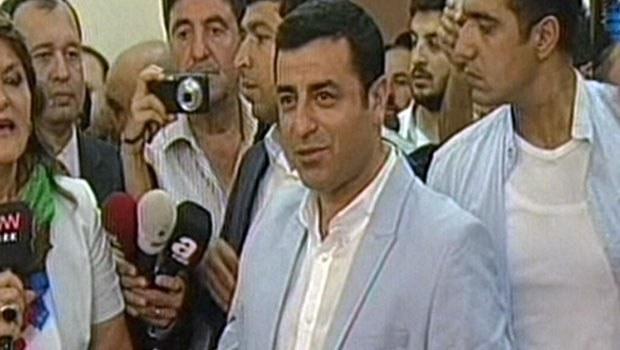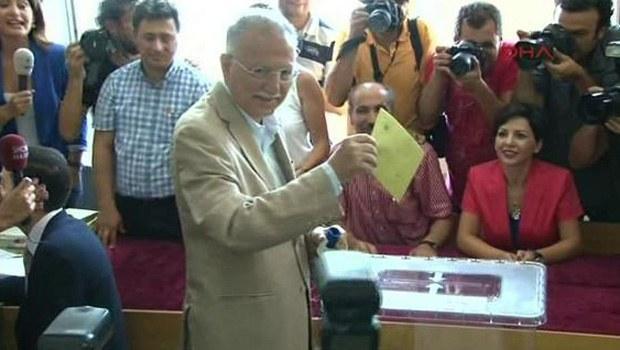As it happened: Erdoğan vows 'new era' after elected Turkey's 12th president
ISTANBUL / ANKARA / DİYARBAKIR

A supporter displays a picture of Turkish Prime Minister Recep Tayyip Erdoğan on a tablet during celebrations at his election victory in front of the party headquarters in Ankara on Aug 10. REUTERS/Ümit Bektaş
Around 53 million people headed to the ballot box across Turkey on Aug. 10 to choose the country’s next president, with Recep Tayyip Erdoğan being elected by popular vote for the first time in the nation’s history.
The three candidates, Erdoğan, who has ruled the country for 12 years as prime minister, Ekmeleddin İhsanoğlu, the former head of the Organization of Islamic Cooperation and a joint candidate of the Republican People’s Party (CHP) and the Nationalist Movement Party (MHP), and Peoples’ Democratic Party (HDP) co-leader Selahattin Demirtaş each called on their supporters to vote, but the turnout was lower than expected.
Erdoğan was elected in the first round, sweeping more than half the vote in a result his opponents fear heralds an increasingly authoritarian state.
CLICK HERE FOR THE RESULTS Here is a live update of the voting:
23:55 - As Erdoğan's victory speech concludes with a fireworks show, all his aides salute the crowd one by one.
23:50 - Almazbek Atambayev, president of Kyrgyzstan, takes the stage, posing with Erdoğan. "Turkey is strong now," Atambayev said in Turkish, "thanks to Erdoğan." The visiting president also led a prayer for Turkey: "God protect Turkey, God pave its way," Atambayev said. The crowd responded: "Amen." (Photo: REUTERS/Ümit Bektaş)
 23:42 -
23:42 - U.S.-based Islamic cleric Fethullah Gülen, the Turkish government's ally-turned-nemesis,
is the only name singled out by Erdoğan for criticism in his broadly reconciliatory speech. Referring to Gülenists as "the parallel structure," Erdoğan calls the movement's "grassroot adherents" to distance themselves from the "gang of treason" in charge of it. "Whoever threatens our national security will find us against themselves," Erdoğan says, urging Gülenists "to open a new page in the New Turkey."
23:32 - "We never intervened in anybody's personal life," Erdoğan says. "Those who accuse us of becoming a dictator should please question themselves sincerely."
23:25 - "There are no losers here. Only the status quo lost," Erdoğan adds, vowing to start a "new era of social reconciliation by leaving old disputes in the Old Turkey." "Let's mobilize our energy for New Turkey."
23:17 - Addressing a large crowd in Ankara, Erdoğan defines the election as a “historic day.” “I greet you with all my heart on this historic day, a trophy night of democracy and the national will. All of Turkey has won today.” Erdoğan also expresses his desire that the elections will be good for the whole country and all friendly countries, while naming Gaza, Ramallah and Jerusalem among the winners. “Today we are closing an era and stepping into a new era,” he says.
23:07 - Prime Minister Erdoğan, now the unofficial president-elect of Turkey, starts his victory speech in Ankara by thanking everyone. "Today, those who didn't vote for me have also won," Erdoğan says.
 23:00 -
23:00 - Erdoğan is expected to take the stage for his "balcony speech" soon.
 22:32 -
22:32 - Noting that 5 million voters did not cast ballots, MHP leader Devlet Bahçeli argues that those voters would bear responsibility for any negative political developments in the country’s future. “Everybody should know that the MHP is respectful of the democratic choices of the Turkish nation,” Bahçeli nonetheless says. “Of course, we will review results in detail. However, we sincerely expect from and advise everybody to do the same,” he says.
22:00 - The High Election Board (YSK) chair Sadi Güven announces Erdoğan wins presidential elections according to interim results.
21:33 - Ekmeleddin İhsanoğlu has admitted defeat with a speech at his campaign headquarters, while noting that "39-40 percent is a remarkable figure." Before congratulating Erdoğan on his victory and thanking his supporters, "an army of volunteers," İhsanoğlu said: "This is dedicated to those who told me that I didn’t know about politics a month ago when we started the campaign."
21:21 - Peoples’ Democratic Party (HDP) candidate Selahattin Demirtaş, who significantly increased the votes of his party in the local elections, said in his first statement after the announcement of the results that his message had reached every corner of the country. “Our campaign has made an important breakthrough and had significant success. We will continue to defend our principles with more determination and insistence,” Demirtaş said in his campaign center in Diyarbakır. (
Click here for details)
21:15 - According to unofficial results, Erdoğan has been elected Turkey's 12th president with 51.8 percent of the vote. In the first popular voting for president, İhsanoğlu received 38.5 percent and Demirtaş obtained 9.7 percent with 96.5 percent of the ballot boxes counted. Turnout was lower than expected at 74.4 percent.
20:55 – Turkish Justice Minister and former prime ministerial protégé Bekir Bozdağ prayed on his Twitter account for Erdoğan’s success. “May God not let our president down and help him succeed in his new duty and help him in all his decisions… Amen,” Bozdağ wrote on his account.
20:20 - Erdoğan made a short speech at the ruling AKP's election coordination center in Istanbul in front of a large crowd. "We will continue to serve our nation for a better democracy and to make the resolution process rein," he said.
20:05 - The Eyüp Sultan mosque was historically the first stop for Ottoman sultans, as well as caliphs, after they ascended to the throne.
 19:48 -
19:48 - Erdoğan has left his home in Istanbul for the capital Ankara, where he is expected to make his now traditional “balcony speech” from the AKP’s headquarters. But according to CNNTürk,
his first stop on his way to the airport will be the Eyüp Sultan Mosque, a pilgrimage site for Muslims, where he will symbolically perform a prayer of gratitude for his election victory.
 19:45 -
19:45 - 96 percent of votes counted so far and the picture didn't change dramatically:
Erdoğan: 52.3%,
İhsanoğlu 38.5%, Demirtaş: 9.2%,
Counted votes: 96%, Turnout: 76.6%
19:30 - The CHP and MHP’s joint candidate Ekmeleddin İhsnaoğlu said they expected a propitious result in his first comments after the announcement of the initial votes. “We are following the results. We are still gathering the numbers. We will make an announcement when it’s appropriate,” İhsanoğlu said.
19:20- Erdoğan: 52.2%,
İhsanoğlu 38.7%, Demirtaş: 9.1%,
Counted votes: 87.3%, Turnout: 76.6%
18:45- 63.1 percent of the ballots have been counted. Erdoğan has taken 53.7 percent, İhsanoğlu is at 37.3 percent and Demirtaş stands at 9 percent, according to CNNTürk, which is averaging the data coming from the pro-government Anadolu Agency and the private Cihan News Agency.
18:30- Latest:


 18:16-
18:16- The first results show Erdoğan is ahead in the presidential race:
CLICK HERE FOR THE FIRST RESULTS 17:59 - Despite the fact that 22.5 percent of votes have already been counted, the electoral authorities still didn't revoke the ban on media to publish initial results.
17:47 - Turkey's Finance Minister Mehmet Şimşek, also a Twitter user, has joked about the name of his southeastern hometown, Batman, after casting his vote:
 17:00 -
17:00 - Polling has ended around the country. "We don't know which side didn't go to vote," Adil Gür, a prominent pollster, has said during a live broadcast on CNNTürk television, while answering a question about increasing speculation that there was a low turnout.
16:56 - "We don't know which side didn't go to vote," Adil Gür, a prominent pollster, has said during live broadcast on CNN-Türk television, while answering a question about the ever-rising expectations for a low turnout.
16:44 - After several complaints suggesting that many citizens couldn't vote because their names were not on the lists at the ballot boxes, High Election Board (YSK) President Sadi Güven released a statement. Güven reassured the public that only those who will turn 18 or fulfill their military service between Aug. 10 and a possible second round on Aug. 24 will be affected. "They'll be able to vote if there will be a second round, when they turn 18 or are discharged from the military," he said.
15:50 – Iranian-born Azeri businessman Reza Zarrab, the main suspect in the graft probe that has shaken the country, has used his Turkish citizenship to cast his vote in Istanbul’s Beykoz district, well protected by his ever-present bodyguards. Although there were three candidates running for the presidency in the voting ballots, Zarrab, who was controversially set free a few months ago, said he only noticed one. “Honestly I only saw one candidate on the ballot. Was there any other? Hopefully Turkey will win,” said Zarrab, winking at those who could take an educated guess as to who might be the candidate that outshone the others. The businessman, who allegedly had the government in his pocket, was praised by Erdoğan as an “honest” and “benevolent” person at the height of the corruption scandal.
 15:30 -
15:30 - Google’s special doodle
for the elections has prompted debate
as the supporters of both Prime Minister Recep Tayyip Erdoğan and his main opponent, Ekmeleddin İhsanoğlu, claimed it suggested the technological giant was giving a "subliminal message" in favor of their rival. (
Click here for details)
14:33 - As usual, Prime Minister and presidential candidate Recep Tayyip Erdoğan cast his vote with his family at Saffet Çebi School in the Üsküdar district where he resides. Erdoğan stressed that electing the president with a popular vote is a "first in our political history" in a statement in front of the ballot box. After describing the election process as "calm, but enthusiastic and exciting," he continued: "These elections are important for carrying us to 2023 and 2071. We hope that the turnout will be high." Erdoğan will monitor the election results at his campaign headquarters on the shores of the Golden Horn in Istanbul. (Photo: Anadolu Agency)
 14:25 -
14:25 - Abdullah Gül casts his last vote as President at Çankaya School in Ankara. “My entire wish and advice is that Turkey should return to its real agenda starting from tomorrow and continue its path by strengthening its democracy and law and reinforcing its economy,” Gül said in a short statement after casting his vote. The outgoing president left the election center without answering journalists' questions.
 13:25 -
13:25 - Despite earlier indications of a possibly high turnout, several independent observers are suggesting on social media that the participation rate has been much lower than the March 30 local elections so far.
12:47 - Gülşen Orhan, an AKP deputy from the eastern province of Van, was pelted with stones by unidentified attackers while observering the voting process at a ballot box in the Edremit district. "Some 150 people surrounded us suddenly. We were harassed. They also damaged our cars while we were fleeing," Orhan told journalists, according to an Anadolu Agency report.
12:06 - MHP chair Devlet Bahçeli casts his vote at Anıttepe School in Ankara. In a short speech, he noted that this was the first time that Turkey was electing its president in a popular vote. "Good luck with it," he simply added.
11:45 - Public broadcaster Turkish Radio and Television Corporation’s (TRT) policy during the presidential campaign has been the most contentious issue of the campaign season. (
Click here for details)
11:30 - Turkish PM Erdoğan received the highest amount of donations among the presidential candidates. (
Click here for details)
11:18 - CHP chair Kemal Kılıçdaroğlu casts his vote at Arjantin School in the Çankaya neighborhood of Ankara. “We know that the elections are being conducted under very difficult circumstances,” he said, stressing that 14 political parties had agreed on a joint candidate, İhsanoğlu, for the first time.
10:47 - Presidential candidate Selahattin Demirtaş casts his vote at Şehit Jandarma Üsteğmen Tevfik Pehlivan School in the southeastern province of Diyarbakır. “Whatever result we will get today, it will not be the end of the struggle for democracy. Today is just a beginning,” Demirtaş said, adding that he “voted for the candidate that takes the side of the people and the oppressed.”
 10:34 -
10:34 - Presidential candidate Ekmeleddin İhsanoğlu votes at Yeniköy School in the Sarıyer neighborhood of Istanbul. “We are sure of the common sense of our people. The most accurate election survey is being conducted today,” İhsanoğlu said, stressing that his campaign would file criminal complaints against all attempts of fraud and irregularity at the ballot box.

10:00 - Some Turkish citizens aren’t able to vote even if they want to. Turkey’s Family and Social Policies Ministry ruled that “the rule of secrecy and the ongoing threats” made it impossible to let more than 5,000 domestic violence victims vote in the elections. (
Click here for details)
09:30 - Hundreds of Turkish citizens returning from holidays to vote in their hometowns have caused traffic jams in Çanakkale, raising expectations of a high turnout in the northwestern province. (
Click here for details)
09:00 - All three candidates gave assertive messages in their last rallies yesterday. (
Click here for details)
08:30 - This is how Turkey votes:
08:15 - The ballots have photos and the names of the three candidates. (
Click here to read about their profiles)
08:00 - Voting has started throughout Turkey. It is expected to last from 8 a.m. to 5 p.m.
07:30 - Election officials take an oath on their “honor, conscience and all that is sacred” at a ballot box in a school in Istanbul’s Üsküdar neighborhood:
BACKGROUNDThe new president will serve a five-year term and has the right to stand for another stint in office. Outgoing President Abdullah Gül’s tenure will end on Aug. 28.
If Turkish Prime Minister Recep Tayyip Erdoğan is elected as president, speculation will turn as to who will replace him as Turkey’s prime minister.
Turkey’s main opposition had voiced concerns regarding possible attempts of fraud. The CHP also launched a large campaign to oversee the elections with a network backed by an SMS line. Party officials will compare the results via using the cb2014.chp.org.tr online system and can send the voting totals at all ballot boxes to 2977, free of charge. The party also launched another online system, sts.chp.org.tr, for all citizens to check the results at their ballot boxes.
Meanwhile, Turkey’s top election body has declared an Organization for Security and Co-operation in Europe (OSCE) interim report on the country’s state of affairs in the run-up to the presidential election as “groundless.”
“It is not possible to understand the groundless report [by the OSCE] which was prepared in a way to sway public opinion to think that the ‘YSK [Supreme Election Board] is arbitrarily printing ballots,’ [in other words] saying there is no legislation even though legal provisions are clear,” YSK President Sadi Güven said in a written statement released Aug. 7.
Güven’s statement came in response to claims listed in an interim report by the Limited Election Observation Mission (LEOM), which was deployed by the OSCE Office for Democratic Institutions and Human Rights (ODIHR) on July 31.
In its report, the OSCE delegation stated that the ballot order of the presidential candidates was selected by the YSK in a lottery and that it had already started printing ballots.
“The YSK informed the OSCE/ODIHR LEOM that the total number of ballots to be printed was 73,849,080. The YSK’s decision on the number of ballots to be issued lacks a clear legal basis,” the delegation said.
However, according to Güven, “the report’s credibility should be questioned,” because it “clearly wrote that the Peoples’ Democracy Party [HDP] couldn’t nominate a representative to the YSK even though it nominated a presidential candidate” and the OSCE delegation “didn’t believe this despite the board informing [the OSCE delegation] that they in fact had a representative.”
The report recalled that four parliamentary parties and groups who received the highest number of votes in the last general election have the right to appoint non-voting representatives to the YSK.
“Though the HDP nominated a presidential candidate, it did not meet the above requirement and therefore could not nominate its representatives to the YSK or to lower election boards,” the OSCE report said.
Güven, however, said the HDP’s representative at the YSK also participated in a meeting between the board and the OSCE delegation.
“The delegation didn’t believe us, even though the YSK members introduced [the HDP representative] and showed them a copy of the original assignment letter, [the OSCE delegation still] questioned the matter. While this behavior is both offending and unacceptable, it is also not understood why it was additionally noted in the interim report,” said Güven.
“It is not true to say that decisions made by boards, where political parties representing 95 percent of the electorate, are not open to the public. Furthermore, decisions which set precedent are being posted on the YSK website,” the YSK president also said.
“Despite a previous OSCE/ODIHR recommendation, electoral board meetings are closed to the public and not all regulations and decisions are posted on the YSK’s website or are otherwise publically available. According to the YSK, non-voting party representatives have full access to their documents,” the report said.
Also on Aug. 7, the head of the OSCE’s election observation team in Turkey said their final report would include recommendations to improve Turkey’s election system. The final report will be released within two months of the Aug. 10 vote.
Elsewhere, Güven, Parliamentary Speaker Cemil Çiçek, the president’s secretary-general and the Prime Ministry undersecretary held a meeting early Aug. 8 over the upcoming elections.
Turkish citizens living abroad already cast their vote in their country of residence last week, although the turnout was much lower than expected.
According to a senior government official speaking to Reuters, out of the 2.8 million eligible Turkish voters abroad, only 8 percent had voted.
Deputy Prime Minister Emrullah İşler on Aug. 4 also suggested that the YSK was to blame for the low turnout due to its strict interpretation of voting regulations.
